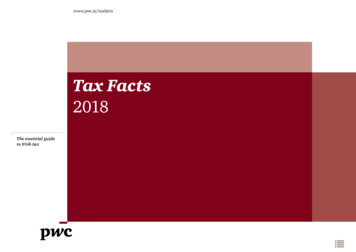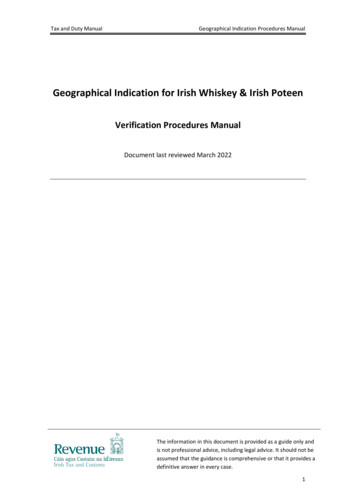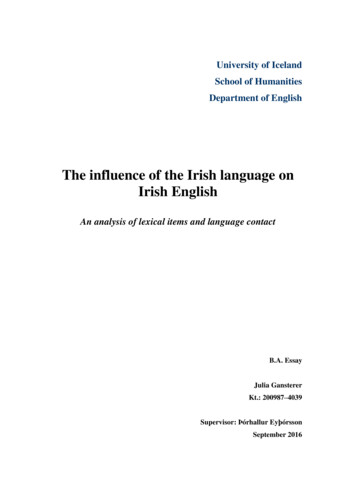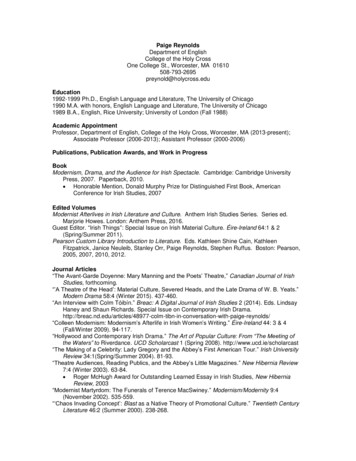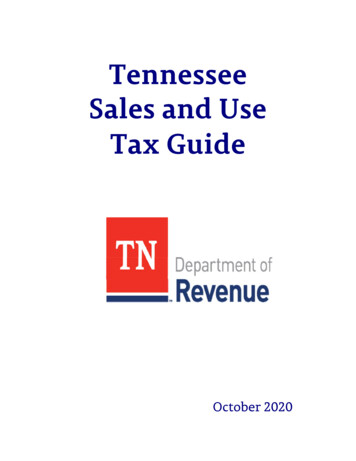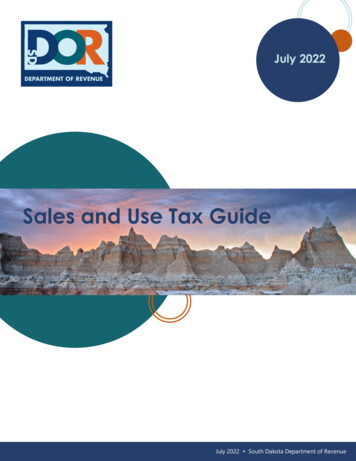
Transcription
Moving abroadIrish Tax guide2019
Moving abroad Tax guideThis tax guide aims toprovide individuals whoare contemplating movingabroad with informationconcerning the possible Irishtax implications arising as aresult of such a move.03
Moving abroad Tax guideContents1. Introduction052. Residence, ordinary residence anddomicile063. Taxation of employment incomewhile abroad084. Employment income reliefs105. Other income tax considerations116. Irish tax system137. Taxation of income148. Social Security159. Capital Gains Tax (CGT)1610. Capital Acquisitions Tax (CAT)17Appendices11. Personal tax tables 2018 & 20191812. Capital Acquisitions Tax thresholds2004
Moving abroad Tax guide1. IntroductionMovingThis tax guide aims to provide individualswho are contemplating moving abroad withinformation concerning the possible Irishtax implications arising as a result of sucha move.Along with providing a summary of the Irishincome tax, social security, capital gainstax and capital acquisitions tax rules thatindividuals leaving Ireland should be awareof, our guide also provides informationconcerning the potential tax savings whichcan be realised by individuals movingabroad together with guidance in relationto any possible trailing tax issues that mayarise.05Where a tax-resident individualleaves Ireland with the intentionof being non-resident in thefollowing tax year, a claim for‘split year relief’ in the year ofdeparture can be made whichessentially means that anyemployment income earnedfollowing their departure fromIreland is not taxable in Ireland.
Moving abroad Tax guide2. Residence, ordinaryresidence and domicileThe criteria used to determine anindividual’s liability to Irish tax are hisresidence, ordinary residence and domicilestatus. For the purpose of determining thisit should be noted that the Irish income taxyear is aligned with the calendar year.2.1 ResidenceAn individual is treated as being resident inIreland if, in the tax year from 1 January to31 December, an individual: Is physically present in Ireland for 183days or more or Spends a combined total of 280 days ormore in Ireland in both the current andpreceding tax years, provided that theywill not be treated as resident under thistest for any tax year during which 30 daysor less are spent in Ireland.A day is counted if the individual is presentin Ireland for any part of a day. The purposeof their presence is irrelevant.2.2 Ordinary ResidenceAn individual is regarded as ordinarilyresident in Ireland for a tax year if they havebeen an Irish resident for each of the threepreceding tax years. Once they becomeordinarily resident in Ireland, they do notcease to be ordinarily resident for a taxyear unless they have been non-resident inIreland for each of the preceding three taxyears.2.3 DomicileThis term is not defined in the Irish taxcode. It is a complex term and is primarilya question of fact, based on the notion ofan individual’s permanent home to whichthat person intends ultimately to return. Aperson can be considered domiciled in thecountry which is the individual’s permanenthome although they are temporarilyresident in another country.An individual can never be withoutdomicile. Generally, an individual isdomiciled in the country of nationality andin which the greater part of the person’s lifeis spent (i.e. the domicile of origin). Oncean individual has reached the age majority,‘domicile of origin’ can be abandoned and a‘domicile of choice’ can be acquired. In thissituation, factors of presence and intentionwould be required.2.4 Consequences of residence, ordinary residence and dLiable to Irish income tax on1YesYesYesWorldwide income23YesNoYes/NoYesNo Irish source income Foreign employment income to the extent duties of theemployment are performed in Ireland Other foreign income (including foreign employmentincome relating to duties performed outside of Ireland)to the extent that it is remitted into IrelandYesWorldwide income with the exception of: Income from a trade, profession, office or employment allthe duties of which are exercised outside Ireland Other foreign income provided that it does not exceed 3,8104NoYesNoSame as scenario 2 above except:Income from the following sources is not liable to Irishincome tax even if remitted to Ireland: Income from a trade, profession, office or employment allthe duties of which are exercised outside Ireland Other foreign income provided that it does not exceed 3,8105NoNoYes/NoIrish source income06
Moving abroad Tax guide2.5 Domicile levyThe domicile levy is due in respect of anindividual: Who is Irish-domiciled Whose worldwide income for that tax yearexceeds 1 million Whose liability to Irish income tax was lessthan 200,000 for that tax year Whose Irish-located property is greaterthan 5 million in value on the valuationdate for that tax year.The levy is payable on a self-assessmentbasis.The domicile levy itself is a maximumannual amount per tax year of 200,000,which can be reduced to the extent ofincome taxes that are due for that tax yearand that have been paid by or on the duedate of the domicile levy. The due date forthe domicile levy is 31 October followingthe end of the tax year in question. Sharesin trading companies (or holding companieswhose main value derives from subsidiarytrading companies) are excluded from thedefinition of Irish-situated property for thepurposes of the 5 million test.07The domicile levyitself is a maximumannual amount pertax year of 200,000.
Moving abroad Tax guide3. Taxation of employmentincome while abroad3.1 Operation of PAYE when leavingIrelandWhere an Irish employee is leaving Irelandtemporarily, depending on their Irish taxresidence position and number of workdays spent in Ireland, they may continueto have a liability to PAYE on their Irishemployment income earned while workingabroad.3.1.1 Leaving Ireland with the intentionof remaining Irish tax residentWhere an employee continues to be taxresident in Ireland, the Irish employer mustcontinue to deduct PAYE and USC fromtheir employment income notwithstandingthat it may be wholly or partly earnedabroad. This is likely to be the positionapplying to those commuting cross-borderto perform all or part of their duties of anIrish employment in another jurisdiction.In such cases, it is likely that payrollwithholding taxes will also be due in thehost country. Where a double taxationagreement exists between Ireland and thehost country, the individual will be ableto file an Irish tax return in order to claima credit for foreign taxes paid on theiremployment income, thus relieving anydouble taxation.Where a double taxation agreement doesnot exist with a particular country, IrishRevenue will allow a deduction for foreigntaxes against the income liable for tax inIreland.3.1.2 Leaving Ireland with the intentionof breaking Irish tax residenceWhere an employee is non-resident andno duties of his Irish employment (orincidental duties only) are performed inIreland, then it may be possible for theemployer to obtain a PAYE exclusion orderwhich exempts the employer from theobligation to deduct PAYE and USC forthe duration of the period spent workingabroad provided certain conditionscontinue to be met.Where a tax-resident individual leavesIreland with the intention of being nonresident in the following tax year, a claimfor ‘split year relief’ in the year of departurecan be made, which essentially means thatany employment income earned followingtheir departure from Ireland is not taxablein Ireland and a refund of tax may be due tothe individual relating to unused tax creditsand standard rate bands.Where an Irish employer does not makean application for a PAYE exclusion orderand does not apply PAYE to earnings, thatemployer can be held accountable for anytax payable.3.1.3 Leaving Ireland with the intentionof breaking Irish tax residence butcontinuing to work in IrelandWhere an employee is non-resident inIreland but continues to perform the dutiesof their Irish employment in the State,then a liability to PAYE will continue for theperiod of their non-residence.3.2 What to do when you leave IrelandWhere an individual is in receipt of incomeother than employment income, a taxreturn should be filed for the year ofdeparture and any liability settled for theyear. The individual should advise theRevenue of the circumstances of theirleaving Ireland.Where an individual employed under anIrish contact of employment leaves Irelandfor a temporary period resulting in thembeing non-resident in either the year ofdeparture or the following year, a refund ofPAYE may be claimed when the relevant taxreturn is filed.Where an individual is in receipt ofemployment income only but leaves duringthe year, their employer will provide themwith a form P45 setting out their taxableincome earned together with relevant taxespaid during the part of the year in whichthey worked here. A tax return or a FormP50 should be completed by an individualleaving Ireland to ensure that any unusedbalance of tax credits and allocation ofstandard rate band is fully utilised. A refundmay be generated in such cases.A tax return or a Form P50 should be completedby an individual leaving Ireland to ensure that anyunused balance of tax credits and allocation ofstandard rate band is fully utilised.08
Moving abroad Tax guide3.3 Termination paymentsPayments made in connection with thetermination of employment in Ireland maybe subject to tax in Ireland. In general,the reason and nature of the paymentwill determine the tax treatment of thepayment. Where the payment is notregarded as contractual in nature and isnot in relation to services rendered, but isan ex-gratia payment on the termination ofemployment, the payment may be subjectto various tax exemptions and reliefs.3.4 Employment income earned predeparture and paid post departureEmployment income is generally taxedbased on amounts earned rather thanpaid. Where an individual leaves Irelandand subsequently receives a bonusearned in respect of employment dutiesperformed in Ireland prior to theirdeparture, professional advice shouldbe sought in relation to the rates of taxapplying to such income.3.5 EquityWhere an individual participates in theiremployer’s equity schemes, the Irishtax position will depend on a number offactors including the particular type ofequity scheme, the country the individualmoves to and also when the move occurs.Professional advice should be sought withregard to such schemes.09
Moving abroad Tax guide4. Employment incomereliefs4.1 Foreign Earnings Deduction2012 saw the re-introduction of theForeign Earnings Deduction. A deductionis available for employees workingtemporarily overseas in the BRICScountries (Brazil, Russia, India, Chinaand South Africa). Finance Act 2013extended the available deduction toAlgeria, The Democratic Republic ofCongo, Egypt, Ghana, Kenya, Nigeria,Senegal and Tanzania. Finance Act 2015further extended the deduction to Japan,Singapore, Korea, Saudi Arabia, the UAE,Qatar, Bahrain, Indonesia, Vietnam,Thailand, Chile, Oman, Kuwait, Mexico andMalaysia. Finance Act 2016 extended thededuction to Pakistan and Columbia. Thededuction is subject to a maximum claim of 35,000 and applies for the tax years 2012to 2020.For the tax years 2012 to 2014, in orderto receive this deduction the employeemust spend at least 60 days working ina qualifying country in a tax year or acontinuous 12-month period. For the years2015 to 2016, the minimum number ofdays has been reduced to 40. For the years2017 to 2020, the minimum number of dayshas been reducted to 30. These ‘qualifyingdays’ must form part of a period of at leastfour consecutive days spent working inthe qualifying country for the years 2012to 2014. For the years 2015 to 2020, the‘qualifying days’ must form part of a periodof at least three consecutive days spentworking in the qualifying country.The deduction does not apply toemployees paid out of the public revenueof the State (e.g. civil servants, Gardaíand members of the defence forces orindividuals employed with any board,authority or similar body established by orunder statute).The deduction is calculated based onthe amount of time spent working in thequalifying country.For 2015 to 2020, time spent travelling fromIreland to the qualifying country, or fromthe qualifying country to Ireland, is deemedto be time spent in the qualifying country.The deduction is claimed at the end of thetax year when making an annual return ofincome for that year. A deduction will not,however, be claimable where another reliefis claimed by the employee (e.g. split yearrelief, Trans-border Workers Relief, SpecialAssignment Relief Programme, Research& Development Incentive and the limitedremittance basis that still exists).4.2 Trans-border Workers ReliefThis relief is designed to give income taxrelief to individuals who are resident in theState but who work outside the State. Itapplies to individuals who commute dailyor weekly to their place of work outside theState and who pay tax in the other countryon their employment income. While thisrelief benefits those individuals travellingcross border daily to work in NorthernIreland, individuals travelling to mainlandUK and elsewhere to work, returning at theweekends also benefit.Trans-border Workers Relief effectivelyremoves the earnings from a qualifyingforeign employment from a liability toIrish tax where foreign tax has been paidon those earnings. Essentially this reliefmeans that Irish income tax will only arisewhere the individual has income other thanincome from a foreign employment. Therelief also applies to USC.A number of conditions must be met inorder for Trans-border Workers Relief toapply: The individual must have earnings from aqualifying employment The duties of the qualifying employmentmust be exercised wholly outside theState in a country with which Ireland has adouble taxation agreement The income from that employment mustbe subject to tax in the other country andmust not be exempt or relieved from taxin that country The foreign tax due on the income musthave actually been paid to the relevantauthorities and must not be repaid or beeligible to be repaid For every week during which theindividual works outside the State in aqualifying employment, he or she mustbe present in the State at least one day inthat week.Although Trans-border Workers Reliefmay apply to remove the earnings froma qualifying foreign employment from aliability to Irish tax where foreign tax hasbeen paid on those earnings, such incomeremains assessable in the hands of therecipient. The income must be declaredon the individual’s annual return of incomeand normal self-assessment rules apply.Care should be exercised in the cases ofmarried couples/civil partners, where oneof them may be eligible for Trans-borderWorkers Relief and the other has incomeassessable in the State under PAYE.4.3 Travel and subsistence reliefWhere an Irish employee is temporarilyassigned overseas and remains taxresident in Ireland, certain travel andsubsistence expenses can be provided taxfree. The level of travel and subsistencerelief is dependent on the length of theassignment and also on the location towhich the individual is assigned.10
Moving abroad Tax guide5. Other income taxconsiderations5.1 Irish rental incomeRental income arising from propertysituated in Ireland is chargeable to tax hereregardless of the individual’s tax residenceor domicile status. Taxable rental incomeis calculated based on gross amounts ofrents receivable less allowable expenses.Generally, for expenses to be deductiblethey must: Meet the criteria applied to regular tradeexpenses Not be of a capital nature Be incurred by the taxpayer.Revenue. The landlord can then claim thisamount as a credit on their annual incometax return.Wear-and-tear allowances are available inrespect of capital expenditure incurredon fixtures and fittings provided by thelandlord for the purposes of furnishing therental property.Where an individual leaves Ireland, theymay no longer qualify for tax relief atsource on the mortgage interest. Forinterest to qualify for tax relief at source,the individual must be able to demonstratethat the house is still their sole or mainresidence. Where the house is available forrent they will not meet this condition. Relieffor mortgage interest paid in respect ofrental properties will be available subject tocertain other conditions being met and thiswill be claimed when the individual’s annualtax return is filed (see 4.1 above).Interest on money borrowed to purchase,improve or repair the rental property isdeductible in computing the individual’srental income for tax purposes; however,the deduction for mortgage interest is100% allowable of the interest accruing in2019 (assuming that the property is rentedfor the full year). A deduction for suchinterest is not available unless the landlordhas registered the property with thePrivate Residential Tenancies Board.Further considerations apply where alandlord leaves Ireland, becoming nonresident. In order to receive the rentsgross, the landlord must nominate anagent who is resident in Ireland and whocan take on the responsibility to receive thegross rents and file the annual tax returnson behalf of the non-resident landlord.Where an agent is not nominated, thetenant is obliged to deduct income tax atthe standard rate (currently 20%) from thegross rents payable. At the end of the taxyear, the tenant must provide the landlordwith a completed Form R185 to show thatthe tax has been accounted for by the115.2 Tax relief for mortgage interestpaid on a home loanTax relief for mortgage interest on homeloans drawn down prior to 31 December2012 is given to mortgage holders on theinterest paid on a qualifying mortgage ontheir sole or main residence. Tax relief isgranted at source (TRS) by the mortgageprovider.5.3 Foreign investment incomeWhere an ordinarily resident individualleaves Ireland (see table 2.4 on page 5),they may continue to have a liability to Irishtax in respect of foreign investment income(i.e. foreign rental income or dividendincome) until such time as they cease tobe ordinarily resident. Whether or not aliability arises will depend on the level ofthe income received and the provisions ofany double taxation agreement in place.Professional advice should be obtained inany such cases.5.4 Deposit Interest Retention TaxNon-resident individuals are exempt fromDeposit Interest Retention Tax (DIRT).An individual is required to providethe deposit-taker with a non-residentWhere an individualleaves Ireland, theymay no longerqualify for tax reliefat source on themortgage interest.For interest toqualify for taxrelief at source, theindividual must beable to demonstratethat the house is stilltheir sole or mainresidence.
Moving abroad Tax guidedeclaration in order to receive the interestgross.Where an individual is tax resident inIreland and also in a country with whichIreland has a double taxation treaty, anyinterest income may be relieved from thecharge to Irish deposit interest retentiontax and a claim for repayment made.5.5 Local Property TaxLocal Property Tax is an annual tax payablein respect of residential property. The tax iscollected by Revenue and is self-assessed.spread evenly over the tax year.Individuals leaving Ireland may still have aliability to pay Local Property Tax for theyear of their departure notwithstanding thefact that they may be selling their home.Professional advice should be obtained insuch cases.* You can confirm how much LPT is due for 2017 onyour property by accessing your LPT recored onlineusing your PPSN, property ID and PIN.The next valuation date will be on 1 November 2020The Local Property Tax will be based on themarket value of the residential property onthe valuation date of 1 May 2013 for yearsof assessment until 2017. The standardrate is 0.18% for property up to a marketvalue of 1 million and 0.25% on the excessover 1 million. Certain properties areexempt from Local Property Tax, includingresidential property that is used whollyas a dwelling liable to commercial rates.Certain local authorities have adjusted thestandard LPT rate for 2017 by up to 15%*.Revenue have confirmed that where achargeable person has a liability to incometax for a tax year, a surcharge will beapplied to their income tax liability (even ifthe tax return is filed on time)if the Local Property Tax is not paid beforetheir return is filed.Property owners can opt to pay theirLocal Property Tax for 2018 in one singlepayment or to phase their payments overthe period January to December 2019.One of the phased payment options beingmade available is deduction at source fromsalary or occupational pension.Where an individual opts to pay by wayof salary deduction, the payment will beWhere an individual is tax residentin Ireland and also in a country withwhich Ireland has a double taxationtreaty, any interest income may berelieved from the charge to Irishdeposit interest retention tax and aclaim for repayment made.12
Moving abroad Tax guide6. Irish tax system6.1 Self-assessment filing requirementsFor income tax purposes, the tax returnfor a particular tax year must be submittedno later than 31 October of the followingyear. For the 2018 tax year, the tax returnin respect of income earned in the year to31 December 2018, must be submitted nolater than 31 October 2019.6.2 SurchargeIf a return for a particular year ofassessment is not submitted before thespecified date, the tax liability for that yearis increased by a surcharge on the amountof tax assessed, as follows: 5% of the amount of tax subject to amaximum of 12,695 where the returnis submitted before the expiry of twomonths after the specified date 10% of the amount of tax subject to amaximum of 63,485 where the return issubmitted more than two months afterthe specified date6.3 Self-assessment payment of taxThe self-assessment system requires apayment of tax on account (preliminary tax)to be made on or before 31 October in the13tax year to which the payment relates. Toavoid an exposure to interest, the paymentmust be equal to either: 100% of the previous year’s liability or 90% of the final liability for the year inquestion or 105% of the final liability for the prepreceding year. This option is onlyavailable if the tax is paid by direct debitand where there was a tax liability in thepre-preceding year6.4 Revenue online serviceIndividuals within the self-assessmentsystem who file their tax return and paytheir taxes through the Revenue OnlineService (ROS) can avail of an extendedfiling and payment deadline, usually midNovember in the following tax year.6.5 Foreign bank accountsWhere an Irish tax-resident individualopens a foreign bank account during thetax year, a Form 11 tax return must becompleted to declare details relating to thebank account, such as address of the bank,opening bank balance, etc.
Moving abroad Tax guide7. Taxation of income7.1 Irish income taxIreland has a tax credit system rather thana tax allowance system for calculatingincome tax. Once the income liable to Irishtax has been identified, the tax is calculatedand any tax credits available are deductedfrom it. The standard personal tax creditsare set out in the Appendix entitled‘Personal tax tables 2017 and 2018’. Incometax is due at the rates of 20% and 40% for2017 and 2018.An employed individual should apply for acertificate of tax credits and standard ratecut-off point, which will allow the PAYE dueeach pay period to be calculated by takinginto account the individual’s personal taxcredits and tax bands.7.2 Universal Social ChargeThe Universal Social Charge (USC) is atax payable on gross income, includingnotional pay, after relief for certain capitalallowances, but before relief for pensioncontributions.The rates and thresholds are as follows:A surcharge of 3% applies to nonemployment income over 100,000.All individuals whose gross income exceedsthe minimum threshold of 13,000 perannum for 2017 and 2018 are liable to payUSC. Once an individual’s income exceedsthe minimum threshold, the USC is payableon the full amount of their income.Chargeable persons are required to paythe USC with their preliminary tax paymentand any balance due is payable by 31October in the year following the year ofassessment.The USC is a separate charge to income taxand no reliefs or tax credits are allowableagainst it. Excess or unused tax creditscannot be used to reduce an individual’sUSC liability.Certain types of income and individualsin particular circumstances can avail ofexemptions from the USC.2018Income levelsRate of USC 0 - 12,0120.5% 12,012 - 19,3722% 19,372 - 70,0444.75%Over 70,0448%2019Income levelsRate of USC 0 - 12,0120.5% 12,012 - 19,8742% 19,874 - 70,0444.5%Over 70,0448%All individuals whosegross income exceedsthe minimum thresholdof 13,000 per annum for2018 and 2019 are liable topay USC.14
Moving abroad Tax guide8. Social Security8.1 PRSISocial security is payable in the country inwhich an individual exercises the duties ofhis employment regardless of the locationof the employer. Irish social securitycontributions are known as Pay RelatedSocial Insurance (PRSI) contributions.Both employee PRSI (not capped) andemployer PRSI (not capped) contributionsare payable. The PRSI rates are set out inthe Appendix entitled ‘Personal tax tables2018’. In general, employees/employers willpay PRSI through the PAYE system.Self-employed individuals are subject toPRSI at the same rates as an employee.The income on which their contributionsare calculated is uncapped. In certaincircumstances, a director of a companycan be considered as self-employed andmay be subject to self-employed PRSI. Ingeneral, self-employed individuals will payPRSI throughthe self-assessment system.8.2 Temporary postings abroadWhere an employee is temporarily postedto another member of the EuropeanEconomic Area (EEA) or to a countrywith which Ireland has a social securityagreement, the employer can apply for anA1 Certificate or a Certificate of Coveragewhich retains the employee within thehome social security system for theduration of the posting. As the employeecontinues paying Irish social security whileworking abroad, their social security recordremains intact and they continue to beentitled to all social security benefits herein Ireland as if they had not been postedabroad.8.2.1 Multi-state workersIndividuals working in two or more memberstates of the EU pay social security wherethey are habitually resident provided that asubstantial part of their activities is carriedout in the state of habitual residence. Anindividual will be considered habitually15resident in Ireland if they are residing hereand have a proven close link to the State.Where an individual has lived in Irelandfor all of their life, they will have littledifficulty demonstrating that they satisfythe conditions which indicate habitualresidence. An A1 Certificate should beobtained by multi-state workers.8.2.2 Third-country nationalsNon-EEA nationals with Irish employersassigned to other EU member statesremain covered by the Irish social securitysystem. This only applies to third-countrynationals residing in EU member states (i.e.does not apply to Iceland, Liechtenstein,Norway and Switzerland).8.2.3 Assignment to countries outsidethe EEA and where no social securityagreement existsWhere an individual employed in Irelandis assigned to a country with which nosocial security agreement is in place, theindividual must be compulsorily insuredin Ireland for the first 52 weeks of theassignment. An employer must applyfor a Certificate of Retention in order forthe employee to continue paying PRSIin Ireland. In practice, a Certificate ofRetention can be sought for periods of upto five years, subject to the agreement ofthe Department of Social Protection.8.2.4 Permanent transfersIndividuals transferring abroadpermanently are usually treated as ‘localhires’ for social security, purposes, meaningthat they are compulsorily insured forsocial security purposes in the country towhich they have relocated.Individuals leaving Ireland should bringdocumentation confirming details of theirsocial security paid while in Ireland in orderto ensure any entitlement to social welfarebenefits in their new country continues,where appropriate.8.2.5 Not remaining compulsorilyinsuredAn individual who ceases to either be anemployed or self-employed contributorother than by virtue of attainingpensionable age may become a voluntarycontributor. Where an individual leavesIreland and will not be compulsorilyinsured abroad they can apply to becomea voluntary contributor within 12 monthsafter the end of the tax year in which theylast paid PRSI or had a PRSI credit. In orderto become a voluntary contributor it isnecessary for an individual to: Have previously paid 364 weeks of PRSI ineither employment or self-employment,if becoming a voluntary contributor on orafter 6 April 2013 Have previously paid 468 weeks PRSI ineither employment or self-employment,if becoming a voluntary contributor on orafter 6 April 2014 Have previously paid 520 weeks PRSI ineither employment or self-employment,if becoming a voluntary contributor on orafter 6 April 2015 Apply within 12 months of the end ofthe contribution year (see note below)during which they last paid compulsoryinsurance or were last awarded a creditedcontribution A gree to pay voluntary contributionsfrom the start of the contribution weekthat follows the week in which they leftcompulsory insurance.While voluntary contributions will enablean individual to qualify for long-term socialwelfare benefits, such as the contributorystate pension, it does not afford anyentitlement to short-term-type socialwelfare payments. Likewise, the payment ofvoluntary contributions is not consideredin determining eligibility for
Taxation of employment income while abroad 08 4. Employment income reliefs 10 5. Other income tax considerations 11 6. Irish tax system 13 7. Taxation of income 14 8. Social Security 15 9. Capital Gains Tax (CGT) 16 10. Capital Acquisitions Tax (CAT) 17 Appendices 11. Personal tax tables 2018 & 2019 18 12. Capital Acquisitions Tax thresholds 20 Contents. oin abroad Tax guide 05 Moving This tax .
